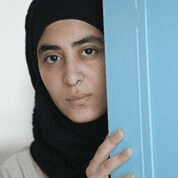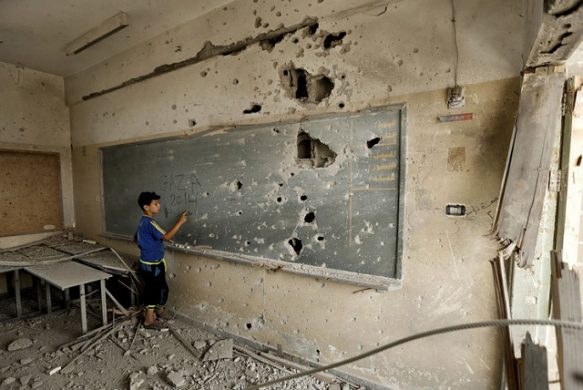Batoul, a 14 year old Palestine refugee, has known conflict and war for much of her life. During her flight from Syria, her father and brother were 
Batoul, en 14-årig palæstinensisk flygtning, har oplevet krig hele sit liv, men hun stræber efter at få en uddannelse – for “det giver mig håb”, siger hun.
Foto: UNRWA
When I met her in Ein El-Helweh camp in Lebanon I was moved beyond words.
she says.
Batoul exemplifies how deeply Palestinians value learning and developing skills, often against all odds, and how they seek to rebuild after so much has been lost.
The value of investing in humanity
The summit will emphasize the importance of leaving no-one behind and yet it will take very hard work to ensure that all children truly realize their right to education, even in contexts of conflict and crises.
Many colleagues lost
As workers on the ground, we are all too aware of the enormity of the challenge.
UNRWA provides education to 500,000 Palestinian girls and boys in 692 schools in Gaza, the West Bank, including East Jerusalem, Jordan, Lebanon and Syria. The story of Batoul is also the story of the specialists, teachers and school principals that stand on the front-line, delivering the education she values.
I have the deepest respect for their determination and dedication. They operate in some of the most challenging environments one can imagine and we in UNRWA have lost too many colleagues in recent years: 16 in Syria since the conflict began, with 28 missing, and 11 in Gaza.
At the Istanbul Summit, UNRWA is unveiling a new report whose findings are deeply disturbing.
In Syria at least 70 per cent of 118 UNRWA schools have at some stage of the war been rendered inoperative, either because they were impacted by violence or because we have used them as centres to house the displaced.
Armed groups place weapon components in schools
Our report is equally bleak about the impact of conflict on UNRWA schools in the occupied Palestinian territory. 83 UNRWA school buildings were damaged during the 2014 Gaza conflict. 90 UNRWA school buildings were used as designated emergency shelters for almost 300,000 displaced Palestinians including at least 150,000 children. Six of these school buildings were struck by artillery shells or other munitions, causing deaths and injuries. Weapons components were placed by armed groups in three other schools.
As for Lebanon, periodic outbreaks of violence have forced 36 UNRWA schools to suspend classes for up to a week at a time on different occasions. Over 50 per cent of all our schools in the country have been impacted at one time or another.
distance learning modules.
In Gaza, the majority of our schools for a quarter of a million children reopened within weeks of the 2014 war ending. And as in Jordan, Lebanon, Syria and the West Bank hundreds of specifically trained psychosocial counselors work with deeply traumatized children to recover and move on with their lives.
The Grand Bargain
Development action and emergency aid, expected to be a big theme at the Summit, live side-by-side under one roof in UNRWA. Our teachers become shelter managers during times of crisis and later return to being teachers.
Combining relief, social services, health-care and education, allows UNRWA to look at young Batoul not only as a victim of injustice and violence, but as an actor of her own destiny, with a contribution to make in life.
Pierre Krähenbühl
Foto: UNRWA
Batoul has shown the courage to act. We must act equally decisively to help her and hundreds of thousands of UNRWA students realize the dreams they are working so hard to keep alive.














